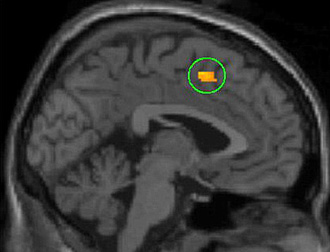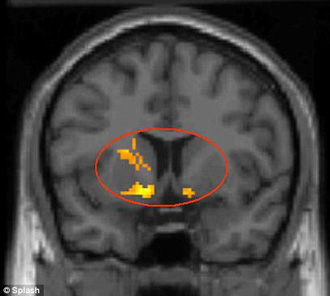
|  |  |  Health & Beauty | February 2009 Health & Beauty | February 2009  
Scientists Discover the Jealousy Lobe
 Daily Mail Daily Mail
go to original


| | Home of the green-eyed monster: This part of the frontal lobe lights up when you are jealous. | 
| | Schadenfreude: This is the region of the brain that controls taking delight in other people's misfortune. |  |
It is a vice that few can avoid but that nobody craves.

Now the area of the brain which controls jealousy has been found, scientists have announced.

It is the same part which detects real physical pain – perhaps explaining why feeling envious of your lover's philandering ways hurts so much.

The spot which makes people delight in others' misfortune – called schadenfreude – was also located by the team.

'It's interesting the part of the brain which detects physical pain is also associated with mental pain,' said Hidehiko Takahashi, who led the research.

'Assessing these feelings of jealousy will possibly be helpful in mental care such as counselling.'

'Envy is corrosive and ugly, and it can ruin your life,' Richard Smith, a professor of psychology at the University of Kentucky told the New York Times.

'If you’re an envious person, you have a hard time appreciating a lot of the good things that are out there, because you’re too busy worrying about how they reflect on the self.'

In the experiments, 19 students were asked to talk of a more successful rival while having MRI scans, which monitor brain activity.

A part of their frontal lobe became more active when the students felt jealous of their rivals, the Japanese study showed.

They then read a story in which the subject of their envy suffered a series of misfortunes, including food poisoning.

Their scan data showed the mishaps sparked greater activity in the 'reward reaction' part of the brain, which normally lights up when receiving social and financial fortune.

'We have a saying in Japanese, ‘The misfortunes of others are the taste of honey,’' said Mr Takahashi. 'The ventral striatum is processing that ‘honey.’'

And there appears to be a relationship between jealousy and schadenfreude. The scientists noted that the more jealous one person was of another, the more schadenfreude they felt at that person's downfall.

'We now have a better understanding of the mechanism at work when people take pleasure in another's misfortune,' said Mr Takahashi.

'This is the way other needs-processing systems like hunger and thirst work,' Matthew Lieberman of the psychology department at the University of California, Los Angeles, who co-wrote a commentary that accompanies the report, told the New York Times.

'The hungrier or thirstier that you feel, the more pleasurable it is when you finally eat or drink.' |

 |
|  |



